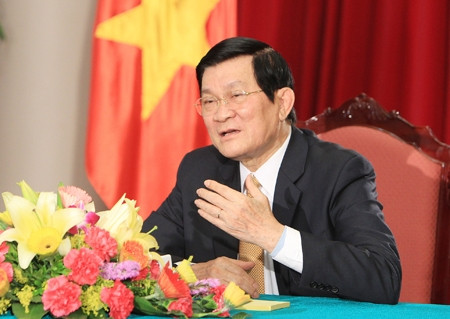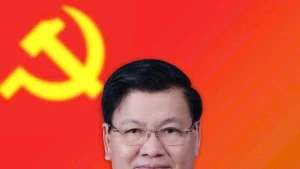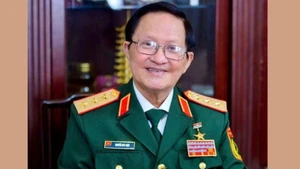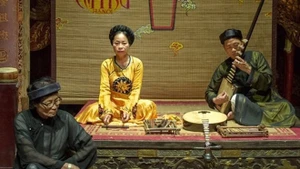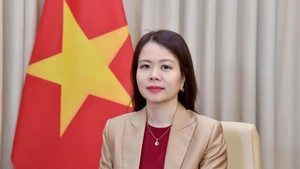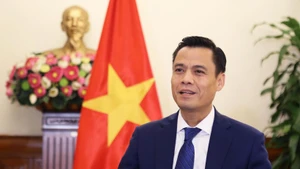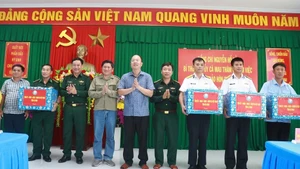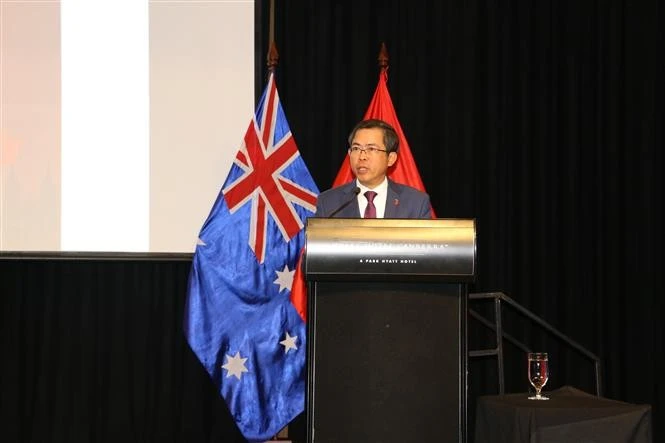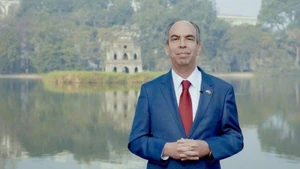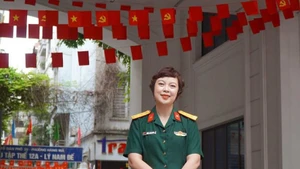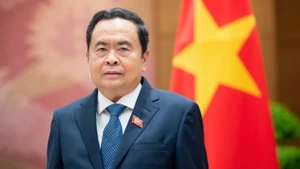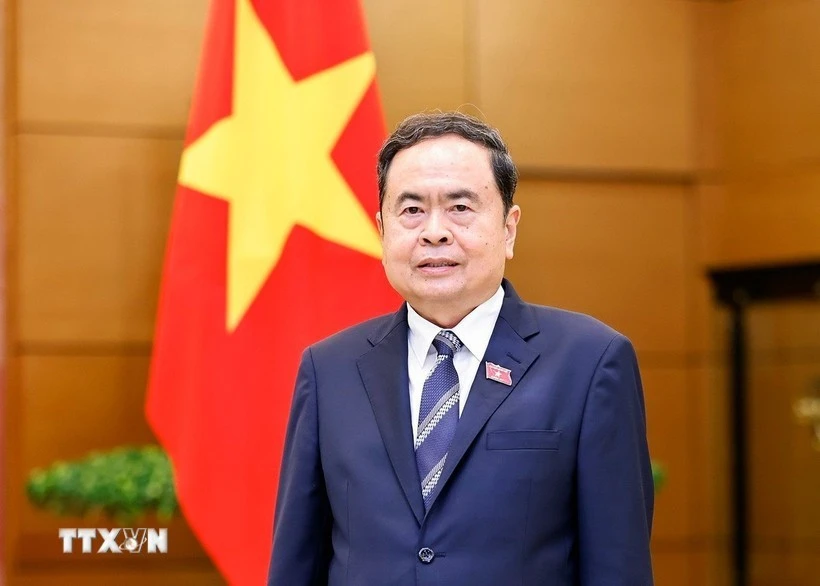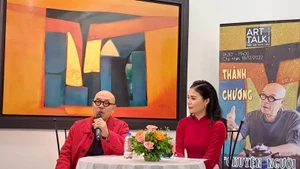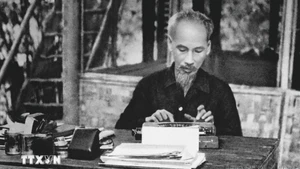Here is a translated excerpt of the interview:
Question: H.E. State President, please give your assessment on the current relationship between China and Vietnam and prospects for strengthening the ties in the future? Do you have any suggestions to further strengthen a comprehensive strategic partnership between the countries?
Answer: Vietnam and China are close neighbouring countries, whose people have a long-standing traditional friendship. During the cause of national liberation and construction in each country, they provided each other precious support. As a result, the Party, State and people of Vietnam have always attached great significance and importance to forging a comprehensive strategic partnership with China.
Over the past years, thanks to common efforts, the Vietnam-China strategic partnership has been strengthened, making important contributions to development and advancement in each country.
Political exchange is regularly carried out with many visits, meetings and talks between leaders of the countries. There is considerable co-operation in the fields of economics, trade, and investment and, in addition, tourism is beginning to see new developments. Co-operation between ministries and agencies, and the exchange between localities and mass organisations as well as co-operation in the fields of culture, sports, arts, education and training are increasingly growing both in width and depth.
At present, the cause of national construction and development in both countries is faced with new opportunities and challenges. More than ever, both need a peaceful and stable international and regional environment so each can focus attention to their national development.
In March 2013, Vietnam’s Party General Secretary Nguyen Phu Trong and China’s Party General Secretary and President Xi Jinping held a very important telephone conversation, in which they put forth many ideas on ways to strengthen and intensify relations. At the 6th session of the Steering Committee for Vietnam-China Bilateral Co-operation in May 2013, the two sides reached many concrete agreements that seek to boost bilateral co-operation in a number of areas.
To further foster friendly relations between the two countries, I think the two sides should together try and successfully fulfil the following tasks:
First and foremost, an increase in political trust is crucial and the number of exchanges and contacts between leaders, ministries, agencies and localities should be increased. Leaders of the two countries should meet on a regular basis in flexible and diverse venues in order timely address important issues and set the key directions to enhance ties.
Second, it is necessary to strengthen and expand mutually beneficial co-operation in all areas, especially economics, trade, investment, science and technology, education and training, and tourism. The two sides should increase collaborative efforts in economic development and strengthen mutually beneficial co-operation in all fields.
Third, it is important to continue to build the traditional friendship between the two peoples and can be accomplished through various and diverse people-to-people exchanges, especially among the younger generations and through efforts to intensify the popularity of the cause of national development and the Vietnam-China friendship.
Fourth, the two sides should be patient with the way they address differences on matters as they arise and build on the Vietnam-China friendship, neighbourly relations, and the common perception of senior leaders as well as international law. Differences should be addressed by peaceful and friendly means in a manner that negotiates and maintains stable relations.
We can say that Vietnam and China have great potential and strengths that will help them increase co-operative efforts in the future.
Question: Two-way trade between China and Vietnam has continued to increase, with turnover reaching more than US$40 billion and expected to hit US$60 billion by 2015. Would you please tell us about the potential for economic and trade co-operation between the two sides, limits and weaknesses facing the co-operation, and measures to enhance the co-operation to a new height?
Answer: Both countries consider economic and trade co-operation an important part of the strategic partnership. Potential for economic and trade co-operation between the two countries is significant, and we should exploit the advantages of each side to the fullest extent.
Vietnam and China are important markets to each other. Commodities which cross the shared border are diverse and on the rise. However, Vietnam suffers from a large trade deficit with China, which impacts on sustainable development of bilateral trade. In the coming time, in addition to the maintenance of bilateral trade stable growth, the two sides should work together to take necessary and effective measures to lower this gap.
The investment by China in Vietnam does not correspond to its maximum potential. I think concerned agencies should seek reasons as well as lessons. They should also find measures to increase investment in each country in the coming time.
Vietnam welcomes big and typical projects from China which use modern technology and advanced equipment, especially in the fields of infrastructure, manufacturing and supporting industries. Vietnam wants to export more goods to China, especially agricultural and seafood products.
In the future, we should make more efforts to seek orientations and efficient measures to boost mutually beneficial co-operation. Among others, I think first we should effectively implement signed agreements, including the five-year plan for the Vietnam-China economic and trade co-operation for the 2012-2016 period, in order to have more sustainable and balanced two-way trade, which will contribute to further development of the Vietnam-China strategic partnership.
Question: Please give your opinions on the way to deal with and address sea issues between Vietnam and China?
Answer: We have shown considerable effort and gained precious experience in dealing with tense and complicated issues concerning the two sides’ relations. Most remarkably, the two countries have fulfilled land border and Tonkin Gulf demarcation. With such a spirit, leaders have exchanged opinions in a sincere and straightforward manner many times and they have reached important perceptions on how to resolve the East Sea issue. During General Secretary Nguyen Phu Trong’s visit to China in October 2011, the two countries signed an agreement on fundamental principles guiding how to address the Vietnam-China sea issue. They agreed to comply strictly with the common perception of senior leaders, patiently resolving the East Sea issue by peaceful means based on international law, including the 1982 United Nations Convention on the Law of the Sea (UNCLOS 1982) and the Declaration on the Conduct of Parties on the East Sea (DOC).
Resolving the East Sea issue is of great importance as it relates to territorial sovereignty and the nation’s and people’s sacred sentiments. I think in the future, senior leaders should maintain regular exchanges and dialogue, and from the strategic height and friendly relations instruct and drive the resolution of the East Sea issue by peaceful means. Only in this way will it not negatively impact on the friendly relations and political trust as well sentiments. I expect that in my upcoming visit, Chinese leaders and I will have straightforward and sincere exchanges of opinion, and have more solutions to address sea-related differences and maintain peace and stability in the East Sea.
In addition, caring for fishermen and their boats, and properly dealing with fishing based on friendly relations are also under the perception of leaders. I have visited many coastal areas in Vietnam. Meeting with many fishermen I have found that all of them are hard-working. For generations, their lives have depended on the traditional job of catching fish in the East Sea. Hence, in the coming time, we should show our full interest in fishermen, helping them have better, stable and a more sustainable livelihood. This is suitable to international law and practices.
Question: You have visited China many times and are an old friend of the Chinese people. Upon your upcoming visit to the country, what message do you want to send to the people of China?
Answer: The Vietnam-China friendship is very valuable and the common property of the two peoples, which has been cultivated by generations of leaders and peoples. All of us are responsible for preserving, inheriting and developing this friendship. During my visit to China, I will go to Guangzhou, where President Ho Chi Minh and many other Vietnam revolutionists lived and took part in revolutionary activities. The Party, State and people of Vietnam will never forget the precious assistance given by the Party, State and people of China during our cause of national liberation before, and the cause of national construction today. We really treasure the development of a friendly relationship and comprehensive co-operation with the Party, State and people of China, and consider it a fundamental, consistent and long-standing policy, and a leading priority in Vietnam’s foreign policy. Reality shows that friendship, co-operation and development on the basis of equality, mutual respect and benefit are the only choice for the relationship between the two countries, meeting the common aspirations and interests of the two peoples.
On the occasion, through the media, I would like to convey my sincere and friendly regards to the Chinese people. I hope that the friendly relationship and comprehensive co-operation between Vietnam and China will be everlasting.
